Sisler High School Alumni
Winnipeg, Manitoba (MB)
GEORGE HESHKA Obituary
GEORGE HESHKA was faculty at Sisler High School in Winnipeg, MB. View the obituary, post a memory, or share a photo about George Heshka.
| School Role | Faculty |
| Date of Passing | Mar 25, 2021 |
| About | GEORGE HESHKA D.Litt, O.M., QDJM, B.Sc., B.Ed., OG George Nicholos Heshka died peacefully at his home in Dugald, Manitoba on March 25, 2021. He was born December 6, 1933 at the height of the Depression to Ukrainian immigrants in Winnipeg's Point Douglas neighbourhood. Growing up poor, and speaking not a word of English, George's schooling got off to a rocky start. He failed grade one, felt alienated from teachers and classmates and approached the first several years of school with a mixture of hatred and dread. Then, in grade six, by accessing the small library that his teacher had craftily placed in a corner of her classroom, he became hooked on books. Reading opened up an entirely new world previously unknown to him (there were no printed materials in his home), and led him to take an entirely different, and much more promising, path than the one he appeared to be on. The rest of it is history. Later in life, George would frequently relate how the experiences of his childhood such as these revealed to him the transformative power of books, of the role of individual teachers and of schools in lifting their students out of marginalization and poverty, and why he considered his career as an educator as a calling. George graduated from St. John's High School, then worked for two years with the Canadian National Railway to save up for university, where he would graduate with degrees in physics and education. In 1960 he got his first job as a teacher at Shevchenko School in Vita. He then taught at Transcona Collegiate Institute, was Vice-Principal at Springfield Collegiate Institute and later became the Principal at Argyle High School and Dufferin Elementary School. In 1980, he became Principal of Sisler High School in Winnipeg's North End, a position that he proudly held until the day he died. He was constantly forging ahead with visionary, progressive and student-centered ideas. Whether they were his own, or whether he cleared the path for others' through his leadership, he helped turn these ideas into realities for his students. Knowing from personal experience that hungry kids can't learn, he pioneered one of Canada's first breakfast programs at Dufferin Elementary School in the 1970s. He started Manitoba's first International Baccalaureate programme at Sisler and spearheaded the school's rise to, as recognized by Maclean's magazine, the best all-round high school and one of the top ten in Canada. Throughout his life, but particularly in his later years, he created an extraordinary illusion of eternal energy and youth - which is why all of us who loved and/or admired him find it so difficult to comprehend his death. George didn't regard what he did as a job, but as a calling to public service. He believed in the extraordinary power of education and viewed schools as agents of social change. He equally valued trades, the arts, athletics and academics. The common denominator was excellence. He trusted those who shared the same values and didn't suffer those who were content with less. George's championing of progressive causes wasn't restricted to the educational realm. In the early 1970s, along with his comrade-in-arms Sister Geraldine MacNamara and others, he fought tirelessly - and successfully - to prevent the construction of the city council-approved Sherbrook-McGregor overpass, because it would have demolished a significant portion of the inner city community. Later that decade, he supported environmental groups' efforts to oppose the Garrison Diversion project in North Dakota. In this, as in other projects that involved raising local awareness or the stirring up of local opposition, he tripled his community outreach by enlisting his then six and eight year old children to deliver pamphlets and Stop Garrison buttons door-to-door. George's love of reading never abated, and his areas of interest knew no bounds: from dogsledding to bird watching, from chess to amateur radio to Morse Code, and to being a loyal fan of the opera, theatre, ballet and the symphony. His collection of books on historical subjects could fill a library. He loved nature - the wilder and more mountainous the better – and would often go on long hikes in the Rockies and lengthy solo canoe trips into the remote Canadian wilderness. George's trademark moustache, sense of humour, the twinkle in his eye, and fine taste in vodka (as distinct from his taste in fine vodka) will be sorely missed by many. Predeceased by his parents Rose and Fred and his brother Bill, George is survived by his children Jon and Kris (Roman) - for whom he was and will always remain their hero - their mother Lydia, and grandchildren Tegan and Brock. We would like to express our gratitude to the hundreds of current and former Sisler students and staff, and others in the Sisler and broader Winnipeg community, who have shared their heartfelt stories about George, in person with us or through social and conventional media. We are so proud of him and, after hearing and reading your extraordinary tributes, it gives us great solace to realize that we are not alone in this. In accordance with George's wishes, his cremains will be dispersed by his loved ones in the wild, isolated places he loved so much. At his request, no funeral service was held. In lieu of flowers, George's family requests only that you do something that would make him proud: go out and do something that will make a difference. As published in Winnipeg Free Press on Apr 03, 2021 |

